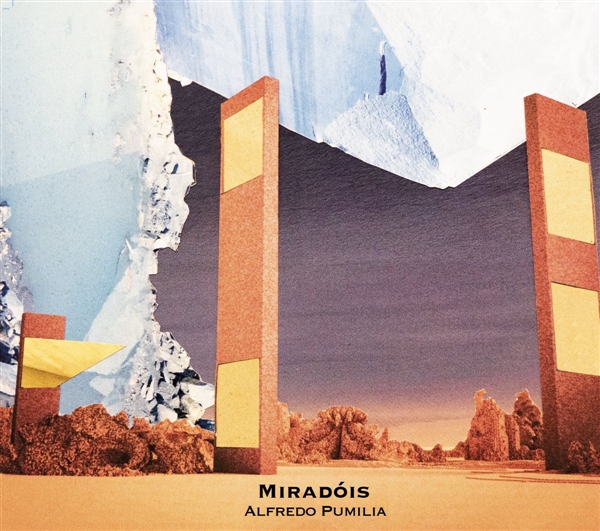Violist en componist Alfredo Pumilia kijkt muzikaal vanaf de berg Miradóis (hartje Naples) naar het westen en het oosten.
English version below
Alfredo Pumilia (Napels 1990) studeerde aanvankelijk dwarsfluit en later gitaar. Maar de muzikale vlam sloeg pas echt in de pan toen hij de muziek van de Franse Hot Club de France violist Stéphane Grappelli hoorde, later aangevuld met de virtuoze klanken van de Roemeense violist Illie Pipica. Hierdoor koos hij uiteindelijk voor de viool en studeerde aan het Conservatorium S. Pietro a Majella in Napels.
Zijn vierde album Miradóis (vernoemd naar de hoge berg in het centrum van Napels) is een super-cross-over album met diverse stijlen die over en door elkaar heen buitelen en dansen. In een wervelwind en kleuren-labyrint horen we muziek uit Spanje, Griekenland (prachtig miroloi timbe van de klarinet in Migration), Cyprus, Bulgarije (heerlijk in Trupéa), Armenië (schitterende duduk in Trupéa) aangevuld met westerse pop, rock en jazz, waarbij zelfs de gitaarkleur van Mali mooi zijn intrede doet in de solo van het stuk Dahar.
Alfredo Pumilia componeerde alle stukken. Hij maakt hierin vakkundig gebruik van stijlwisselingen en combinaties. Hij brengt op organische wijze de verschillende muziekstromingen bij elkaar en creëert daarmee muziek die zó eigen is, dat het een stijl op zich wordt.
Hij speelt viool en wordt hierin bijgestaan door zijn kwartet met pianist Roberto Porzio, bassist Paolo Petrella, drummer Giuseppe Donato en percussionist Salvio La Rocca, aangevuld met zeven gastmusici op ûd (Arabische luit), duduk (Armeens dubbelriet/soort hobo), klarinet, saz (Turks snaarinstrument) en (flamenco) gitaar (enerverend in Zèfiro).
De muziek is spannend, sprankelend, bijzonder en wordt overtuigend gespeeld. Zit vol improvisaties met door en over elkaar (unisono) gespeelde thema’s die een Arabische achtergrond verraadt. De muziek wordt strak gespeeld en is zeer ritmisch, mede o.a. door het gebruik van darbuka, qaraqeb en kleine tamboerijn die met hun frisse timbre de muziek transparant maken. Heldere en bij vlagen virtuoze solo’s op piano, gitaar, klarinet en viool larderen de thema’s en tillen de muziek naar een hoger plan.
Alhoewel de CD Miradóis nog geen 40 minuten duurt, heb je muzikaal toch het hele zuidelijke deel van het Middellands Zeegebied gehoord en begin je gewoon weer van voor af aan….heerlijk!
English version
Violinist and composer Alfredo Pumilia looks musically to the west and east from Mount Miradóis (the heart of Naples).
Alfredo Pumilia (Naples 1990) initially studied flute and later guitar. But the musical flame only really ignited when he heard the music of the French Hot Club de France violinist Stéphane Grappelli, later supplemented with the virtuoso sounds of the Romanian violinist Illie Pipica. As a result, he eventually chose the violin and studied at the S. Pietro a Majella Conservatory in Naples.
His fourth album Miradóis (named after the high mountain in the center of Naples) is a super-crossover album with various styles that tumble and dance over and through each other. In a whirlwind and color labyrinth we hear music from Spain, Greece (lovely miroloi timbe of the clarinet in Migration), Cyprus, Bulgaria (wonderful in Trupéa), Armenia (beautiful duduk in Trupéa) supplemented with Western pop, rock and jazz, where even a Mali’s guitar color makes a beautiful appearance in the solo of the piece Dahar.
Alfredo Pumilia composed all the pieces. He makes expert use of style changes and combinations. He organically brings together the different music movements and creates music that is so unique that it becomes a style in itself.
He plays the violin and is assisted by his quartet with pianist Roberto Porzio, bassist Paolo Petrella, drummer Giuseppe Donato and percussionist Salvio La Rocca, supplemented by seven guest musicians on ûd (Arabic lute), duduk (Armenian double reed/type of oboe), clarinet, saz (Turkish string instrument) and (flamenco) guitar (enervating in Zèfiro).
The music is exciting, sparkling, special and played convincingly. Is full of improvisations and themes played through and over each other (unison) that betrays an Arabic background. The music is played tightly and is very rhythmic, partly due to the use of darbuka, qaraqeb and small tambourine, which make the music transparent with their fresh timbre. Clear and at times virtuoso solos on piano, guitar, clarinet and violin intersperse the themes and lift the music to a higher level.
Although the CD Miradóis lasts less than 40 minutes, musically you have heard the entire southern part of the Mediterranean and you simply start all over again… wonderful!
*Alfredo Pumilia: Miradóis (Liburia Records / Xango)
© Mattie Poels.


Geen reacties